Cynical journalists declare journalism off-limits from criticism
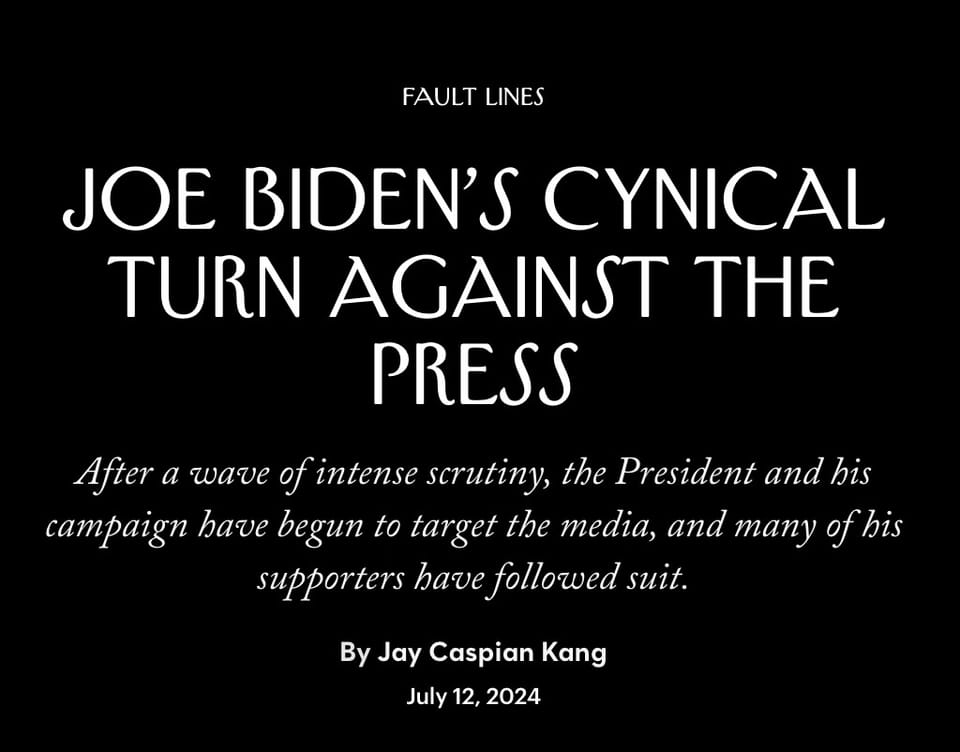
The New Yorker just published a new apologia for the news media (and attack on progressive media critics) by Jay Caspian Kang that’s so thoroughly and deeply wrong as to all but guarantee a warm reception in the newsrooms of America’s most influential news companies.
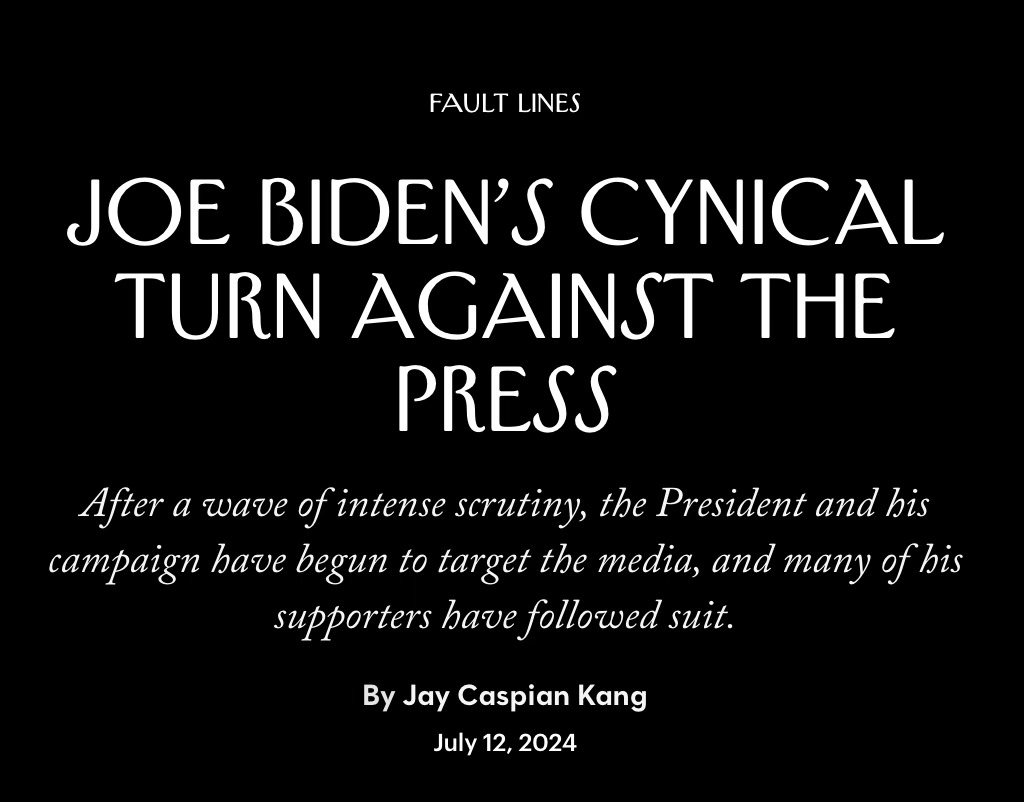
Kang is wrong about why people criticize the media, about the media’s power and influence, about the appropriate way to assess the media’s job performance, about how bias works, about the news media’s role in democracy, and about threats to it. He is wrong about so many things, perhaps because he seems somehow completely unaware that people didn’t just start criticizing the news media last Thursday and also unaware that pretty much every argument contained within his piece has been made a thousand times before, and each one of them rebutted at least as many. It’s a dazzling and distracting array of wrongness: Each paragraph brings a new straw man to point out or ahistorical claim to correct or facile nonsense to rebut. But it’s also garden variety wrongness – Kang is serving barely-warmed-through leftovers here – so it’s tempting to ignore it entirely.
I’m not going to do that, because Kang’s core argument is not just wrong, it is offensive and undemocratic.
Here’s how Kang opens and closes his piece:
Last weekend, the Biden Administration sent out an e-mail that sounded a touch Trumpian. Addressing the immense scrutiny that the press has placed on the President’s cognitive abilities after his disastrous debate, the e-mail, written in Joe Biden’s voice, read, “I want you to ask yourself, what have these people been right about lately? Seriously. Think about it.” The e-mail then went on to list what the Biden Administration apparently thinks “these people” have got wrong, including Biden’s chances in the 2020 primary and the general election, the “red wave” that was supposed to materialize during the 2022 midterms, and a host of uphill policy issues, including gun control and climate-change legislation. “Folks, listen. Forget the pundits,” the e-mail went on, distancing the Biden Administration from the wrongheaded press and its gallery of pundits, and casting the defenders of democracy as “me and you,” which, presumably also means not them.
[…]
If Biden stays in the race, I am certain he will lean into these attacks on the weak press and will ask his supporters why the media evidently wants Trump to win. […] This may very well be the right strategic move for a candidate who will need to ward off leaks and endure close analyses of every video clip he appears in going forward, though it should be said that the Democratic electorate will likely be more resistant to this style of populism than the right. But it’s also deeply cynical and erodes confidence in a free press that keeps powerful people in check. If Biden believes he is the last chance for democracy in America, perhaps he should start acting like it. (emphasis added)
That’s Kang’s core point; it’s how he opens and closes his piece: Joe Biden is launching “Trumpian” attacks on the press that constitute a threat to democracy. This is a breathtakingly dishonest1 false equivalence.
Donald Trump regularly incites violence against members of the media – actual, physical violence – and talks about jailing reporters whose coverage he dislikes. An email “written in Joe Biden’s voice” said the news media have been wrong about his political prospects in the past. These are not remotely the same thing. These things are not in the same ballpark, they are not the same league, they are not the same sport.2 It is a fundamentally unserious claim.
Labeling Biden’s criticism of the media “Trumpian” displays the same lack of proportionality that is so frequently present in media coverage of Biden and Trump, and of politics more broadly. That lack of proportionality is at the heart of progressive criticism of the news media. Kang never addresses the critique, though he inadvertently demonstrates its validity by equating an email saying “forget the pundits” with a years-long effort to incite violence against journalists.
But there’s a more pernicious problem with Kang’s argument: He seeks to shut down even mild critique of the news media — and “folks, listen, forget the pundits” is about as mild as it gets — under the guise of preserving democracy. Journalists do indeed have a vital and essential role to play in democracy; I only wish more of them behaved accordingly. But that role does not mean they shouldn’t be criticized. In fact, the opposite is true. The news media’s importance to democracy is precisely why it should be held accountable, its flaws critiqued, its practitioners pushed to do better.
Every other institution of democracy is subject to this kind of accountability, and more — and rightly so. Democracy does not flourish placing powerful institutions off-limits from dissent and critique. To attempt to grant the news media such an exemption from scrutiny is a perversion of the whole reason for the media’s importance in the first place.
Real assaults on the press — like Trump’s attempts to use violence and intimidation and threats of prison to bludgeon the media into submission are, indeed, threats to democracy. But Kang’s use of the specter of those assaults to declare even substantive criticism of the media’s output off-limits and offensive to democracy is a disingenuous gambit. It is unworthy of the news media’s role in a free society. And it demonstrates the cynicism he accused Biden of.
A press pass isn’t a “get out of criticism free” card, it’s a responsibility. And with responsibility comes scrutiny.
***
You should feel free to stop reading now; I’ve covered the most important part. But if you’re wondering about the rest of Kang’s piece, stick around.
Here’s more Kang:
Those of us in the press are currently being blamed both for protecting Biden and for harming him, for not focussing enough on Trump—a charge that comes after nine years of allegedly paying too much attention to him—and whatever else.
This is disingenuous. The criticism was not that the press paid “too much attention” to Trump, but rather that it gave him too much uncritical attention. The criticism stemmed from the 2016 campaign when television outlets gave Trump an unprecedented amount of free airtime, regularly airing not only entire speeches — which it did not do for other candidates, then or before then or since — but even live feeds of his empty podium long before he even began speaking as they breathlessly hyped Trump and helped launch the Trump era. Trump captured the Republican nomination despite spending significantly less money than his rivals in large part because all that free airtime. There is nothing inconsistent with saying the news media should not have given Trump this unprecedented celebrity treatment worth hundreds of millions of dollars while also saying his flaws deserve greater scrutiny. It’s just a defensive and cheap rhetorical ploy Kang aims at critics rather than engaging in the substance of their critique.
Back to Kang:
But it’s clear to me that the news media doesn’t have anywhere near the level of influence that much of this criticism implies. The messaging power that we might have once wielded has been diluted by the proliferation of various social-media platforms and online channels, and by a broader loss of faith in major institutions, including the press. [...] The reason that so many politicians—not to mention athletes, business leaders, and movie stars—blame the media for everything nowadays, as though journalists can change the course of history and the hearts of every person in the country with a few headlines, is precisely because we can’t do any of that. You don’t fight the media and call the press a bunch of fake-news losers when the media is strong, and can shape opinion in a meaningful or threatening way. You attack when it’s weak.
And here’s where a fundamental flaw in Jay Caspian Kang writing about media critics reveals itself: He has absolutely no idea what he’s talking about. Rather famously, conservatives have been relentlessly attacking the news media for more than 50 years, and they have done so with great success for their political project. It has both pushed the nation’s largest and most powerful media companies further to the right and laid the groundwork for the creation of a vast media ecosystem that is explicitly right-wing, from FOX to OANN. This is not a recent phenomenon, nor an obscure one: During the heyday of news media influence, the Right regularly excoriated the media. It cannot therefore be the case, as Kang claims, that the only reason people criticize the media is that it has lost its power, or that “You don’t fight the media … when the media is strong.” An entire political movement did. It’s very well-known among everyone who knows anything about the topic. Writers presuming to write about politics and media criticism should consider first glancing at Wikipedia or something.
Also news companies do, of course, still have power to shape perception; that angle of Kang’s argument is dumb, too. In fact, Kang knows this. Remember, he ends his piece with a (correct!) reminder of the importance of the news media to democracy. Kang wants to have it both ways: He insists the media is weak and ineffectual so he can sneer at straw men who supposedly think “journalists can change the course of history and the hearts of every person in the country with a few headlines” (nobody thinks this!) while also insisting that “a free press … keeps powerful people in check.”
Kang is not done yet, sadly:
On one level, this critique is ridiculous, of course—it is delusional to think that the news media, which is overwhelmingly staffed by liberals and justifiably ran nine years of harshly critical stories about Trump, has somehow turned into a shadow operative for the Republican Party.
“Journalists are liberals and therefore their coverage can’t possible favor Republicans” is a retort as flawed as it is common. It ducks substantive critique, trying to hand-wave it away with a fallacy that’s somewhere between ad hominem and appeal to authority.
I assume Kang would include the New York Times among those news companies “overwhelmingly staffed by liberals.” That’s the same New York Times that did this:
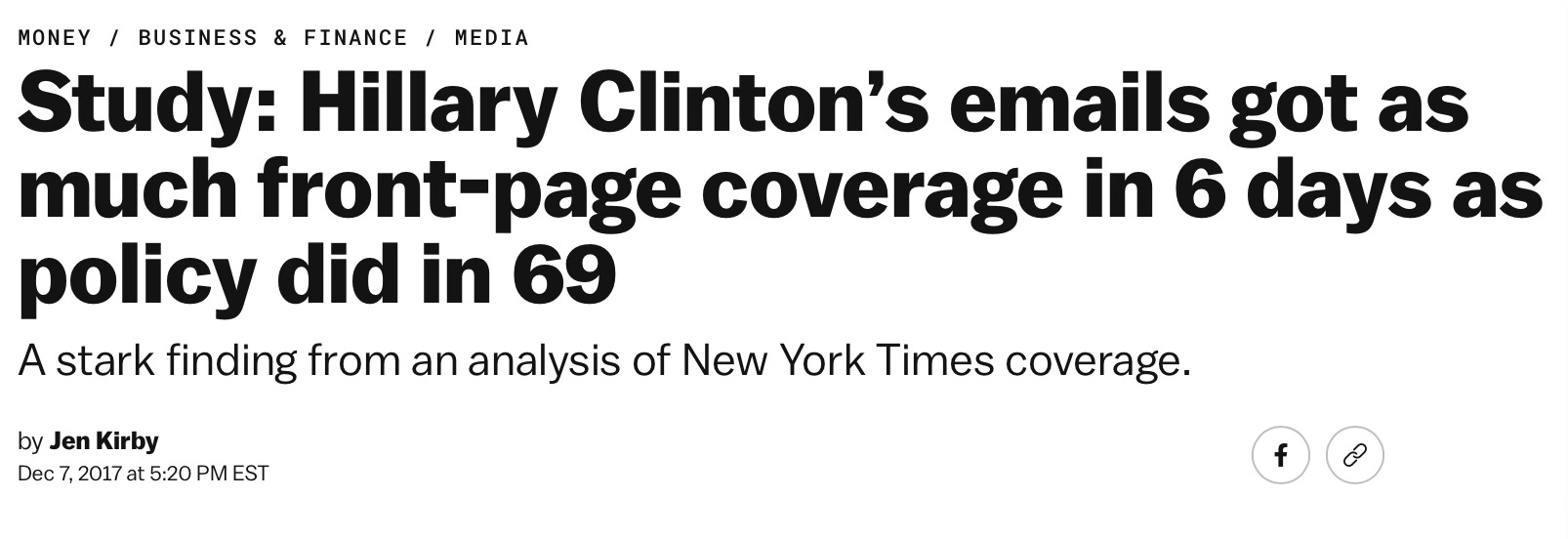
And of course this:
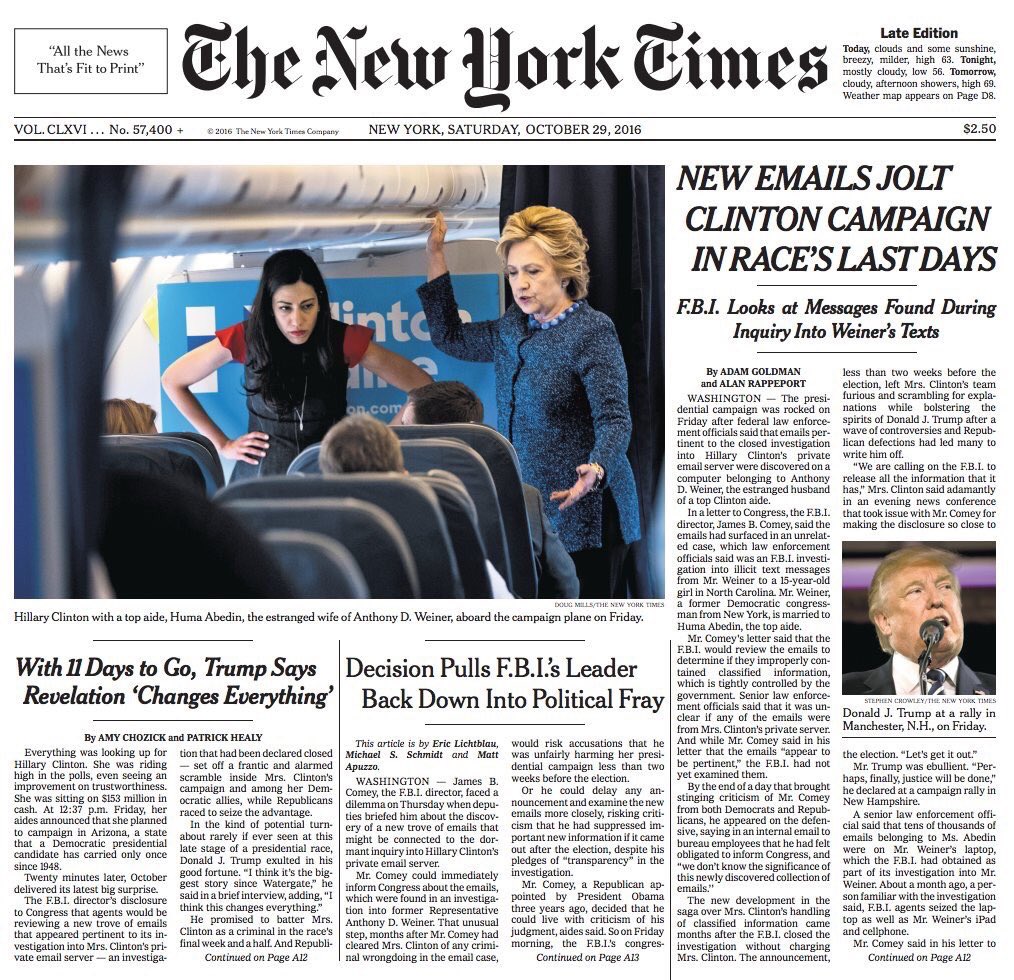
And this:
Not to mention the Times’ relentless war on Al Gore during the 2000 election, its overt cheerleading for the Iraq war, or the glaring double standards its coverage of the mental capacity of Joe Biden and Donald Trump. Kang doesn’t engage any of these specific critiques; he just hand-waves them away: the news media is “overwhelmingly staffed by liberals” and it is thus “delusional” to think their coverage favors Republicans, no matter how clearly their coverage favors Republicans.
So how can we square the output we see with Kang’s assertion that the people generating this news coverage are “overwhelmingly” liberal? It is extremely easy to think of several explanations! Many the “liberal” journalists aren’t as liberal as they think they are. Many of them, convinced of their own (real or imagined) liberalism overcorrect in order to be “fair” to conservatives. Decades of “working the refs” by the Right has had an effect. This, again, is not unplowed ground; every one of these explanations and more has been offered by progressive media critics for decades. Kang just apparently has no idea of the history of the debate he pontificates about.
But for the most part I don’t care about any of those explanations. I am not (for example) New York Times editor Joe Kahn’s therapist. I do not know his innermost thoughts and emotions, and I do not care. When I say the journalism output he is responsible is biased in Trump’s favor I do not mean he intends it to be so (though he might) or wants it to be so (though he might) or even that he knows it to be so (though he might.) I mean simply that it is so, and I base that primarily on the output itself.
It’s a complete misunderstanding of the concepts of favoritism and bias to think that they must be conscious and intentional. Sure, sometimes a person actively thinks “I do not like Black people” or “I am going to discriminate against women.” But we all know that isn’t the only way it works. And that isn’t the way it works with journalists, either. The New York Times is staffed by a bunch of liberals? I don’t necessarily agree, but so what if it is? The work product they are producing is holding Joe Biden and Donald Trump to wildly divergent standards. That’s the part that matters.
Finally, note that Kang writes that the media “is overwhelmingly staffed by liberals.” Staffed is a very important word choice. Just this week the CEO of CNN’s parent company endorsed Donald Trump in all but name, saying of the outcome of. the presidential election: “We just need an opportunity for deregulation, so companies can consolidate and do what we need to be even better.” Deregulation, more corporate consolidation? That’s Trump.
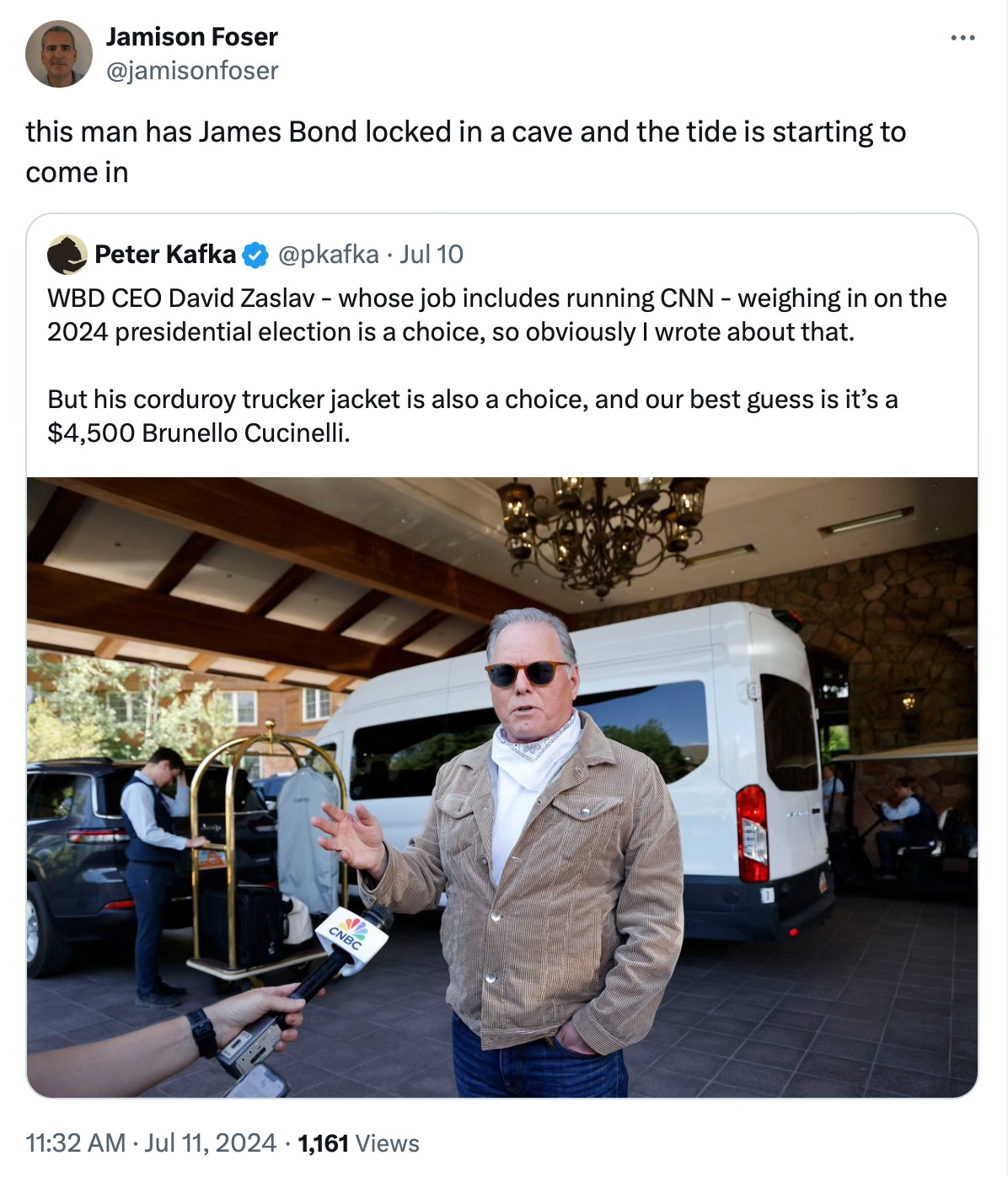
The owners and executives of America’s most influential news companies are very wealthy people who often think it in their financial interest for Republicans to win elections. And they hire and promote (or don’t) the people who run the news rooms, and those people hire and promote (or don’t) the people who staff the newsrooms, and that’s a pretty big elephant for Kang to ignore.
Now, pious journalists will insist that journalism is never influenced by owners or executives’ politics, and sneer that it is “conspiratorial” thinking to suggest otherwise. Of course, journalists will also routinely generate journalism the core premise of which is that everything else in the world is influenced by money; that financial incentives and conflicts of interest are inherently impactful in other fields, even if the people being influenced by it aren’t consciously changing their behavior. What good fortune journalists must have, to have stumbled into the only profession in all the world in which a company ID card comes with the superpower of being immune from the forces that affect everyone you write about.
***
I said up front that Kang’s piece is largely recycled nonsense we’ve seen before. That’s certainly true of his perverse equation of Biden’s mild media criticism with Trump’s threats of violence and jail. Let’s go back to the first year of the Obama administration, shall we? Here’s a piece I wrote for Media Matters at the time in response to extremely dumb comparisons of Obama to Nixon:
The Obama administration’s purportedly “Nixonian” sin is its public criticism of Fox News, a cable channel that has repeatedly tied Obama to terrorists and compared him to Adolf Hitler. Having had enough, White House communications director Anita Dunn, press secretary Robert Gibbs, and others have said that Fox is less a news organization than a partisan political operation. […]
The Washington Post's Ruth Marcus wrote that the criticism of Fox “has a distinct Nixonian -- Agnewesque? -- aroma.” NPR’s Ken Rudin said the criticism is “almost Nixonesque” -- and this was no throwaway comment; Rudin drew out the comparison for a full paragraph. (To his credit, Rudin apologized for the comments the next day, calling them “boneheaded.”) CNN’s Anderson Cooper asked, “(D)oes the Obama White House have an enemies list?” and, “(D)o you see shades of Nixon here?”
[…]
The Nixon administration wiretapped journalists' phones and audited their taxes. G. Gordon Liddy and another Nixon henchman even plotted to murder Jack Anderson. That's “murder” as in “kill.” And “kill” as in “dead.”
Meanwhile, Obama aides have publicly criticized Fox News for lying about their boss.
It is rather obvious that these are not the same things.
Just a little reminder that all of these very dumb things have been going on for a very long time.
I suppose it is possible that it is instead breathtakingly stupid. Your call. ↩
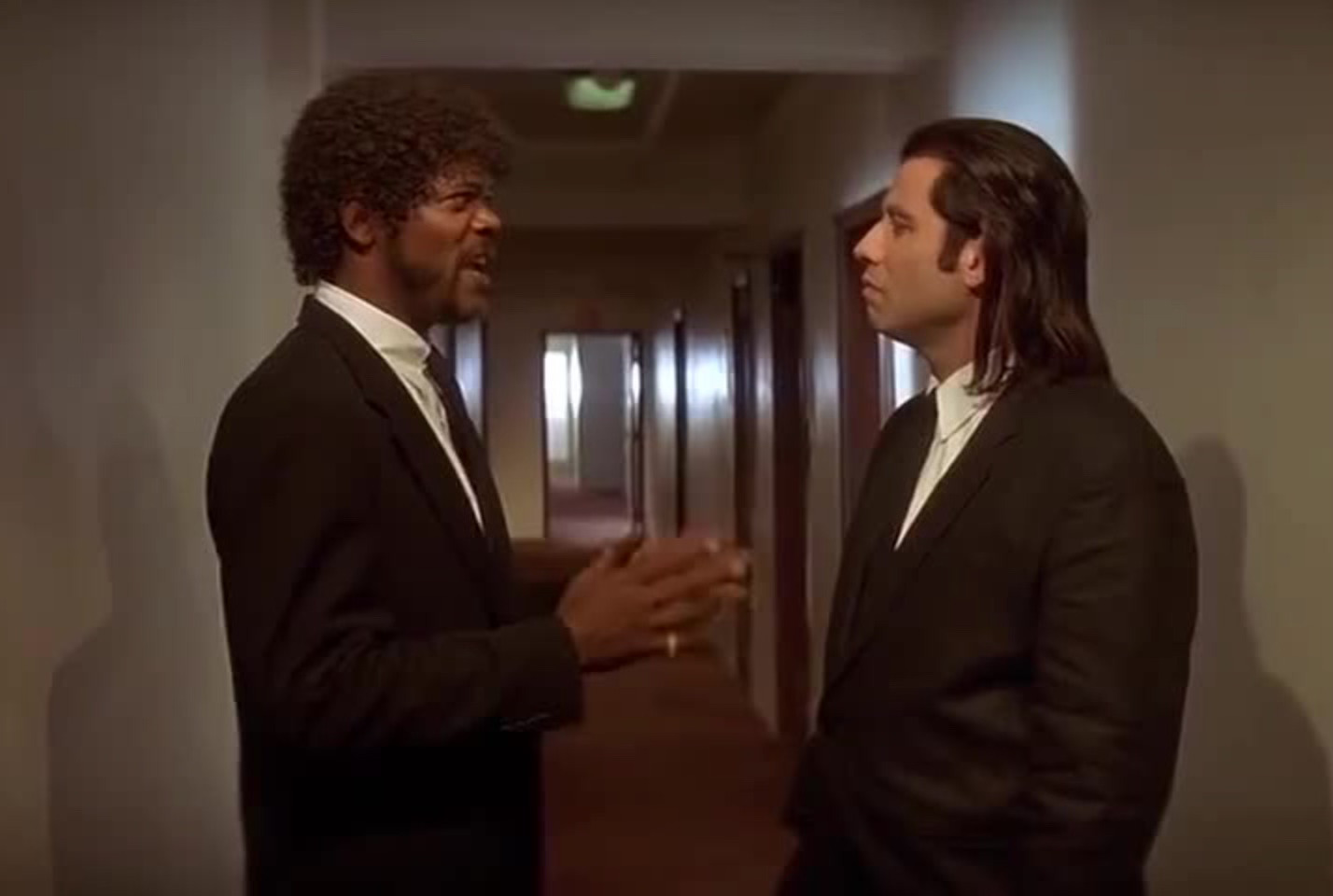
Member discussion